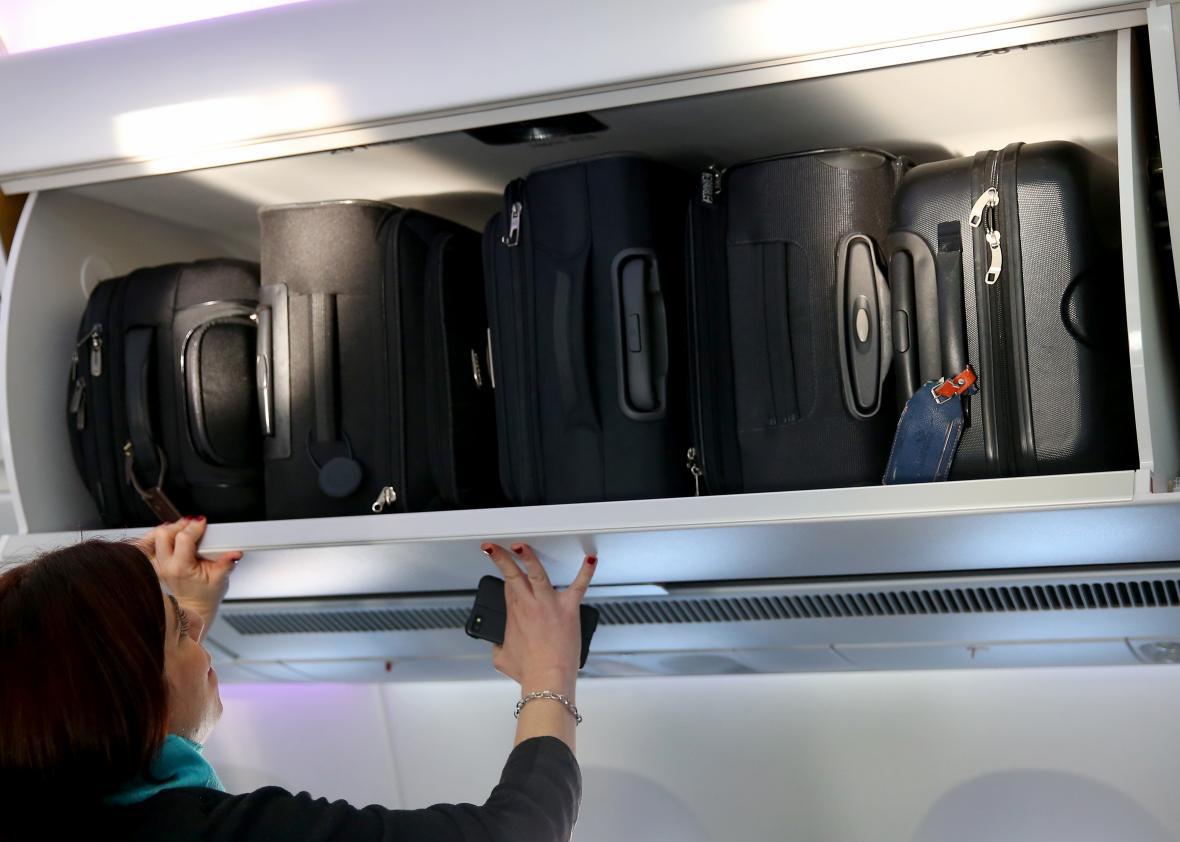Starting early next year, United Airlines plans to begin charging fliers for the privilege of stowing carry-on luggage in their plane’s overhead bin—thus slapping yet another irritating fee onto a basic amenity that travelers have long taken for granted. There has been outrage, predictably, and it has already reached the halls of Congress. “The overhead bin is one of the last sacred conveniences of air travel and the fact that United Airlines—and potentially others—plan to take that convenience away unless you pay up is really troubling,” New York Sen. Chuck Schumer fumed in a statement.
United’s official line is that there is, in fact, no new fee. Rather, the company says it is merely introducing a new, bare-bones fare called “Basic Economy” that won’t entitle passengers to any bin space. Those who pick the no-frills option will be restricted to carrying on whatever small satchel or backpack can fit beneath the seat in front of them. People who want to store their luggage overhead as they always have will still be able to buy a regular ticket, or so United’s social media team has been tweeting incessantly.
This would sound more convincing and less patronizing if the new “Basic Economy” fares were slated to be significantly cheaper than what we all already pay to get shoved in the back of the plane. However, Reuters reports, “Prices will be comparable to low fares it now charges for the economy cabin, but with more restrictions.”
Airlines have generally defended their love of fees by appealing to the economic ideals of price discrimination—the notion that customers should be able to pay for only the services they need instead of shelling out for one standard fare that covers a wide range of baseline services. In theory, there is merit to this approach. Consider checked bags. Shuttling heavy suitcases through the air makes planes heavier and requires extra fuel, which pushes up the price of airfare for all. By putting a fee on checked suitcases, you may convince travelers to pack light. Those who can’t be bothered will pay more, while conscientious travelers will end up paying less, keeping air travel affordable for more customers so long as they’re willing to leave a few pairs of pants at home.
One could try to defend United’s new bin policy on similar grounds. Sure, most of us prefer to travel with more than a gym bag’s worth of belongings. But if United weren’t nickle-and-diming some fliers, it might have to raise prices on all fliers in order to keep its shareholders happy. This at least allows them to keep the cost of flying low for some.
But I would argue that United’s carry-on charge is a jet bridge too far. First off, piling on fee after fee for essentials like a place to put your bag becomes a way to mask the real cost of a fare. You’re not giving customers options so much as duping them.
Second, at some point price discrimination becomes outright discrimination. Consider who United’s new low-cost fare would actually appeal to. It’s probably a person on a short trip who’s young and hale enough to carry all of the belongings they need on their back or shoulder. A couple living out a New York Times “36 Hours” column in Maine comes to mind. Families traveling with children, though? They used to be able to use the bins, but now they’ll be paying that checked bag fee. Elderly passengers who need to wheel their luggage around? Them too. United is slapping fliers with a parenthood and age tax.
Not to get too political with this, but in some ways United’s move is reminiscent of what Republicans would like to do with U.S. health care. One of the chief GOP complaints about the Affordable Care Act is that it forces healthier customers to subsidize the cost of coverage for Americans with more extensive health needs by forcing everybody into the same market. One of Obamacare’s signature features is that it requires insurers to cover a reasonable bundle of basic services that not every customer will end up needing, like mental health and maternity care, as well as preventive services like birth control. If you’re a 29-year-old guy, that means you end up paying more for coverage than you might on a less regulated market, but if you’re a 35-year-old woman, chances are you’ll end up paying less. Most Republican plans to replace the ACA would do away with those regulations, allowing insurers to sell pared-down plans that appeal to the young and healthy. Older, sicker customers, on the other hand, would likely see their premiums go up, just like some older air travelers will likely have to pay more for the bin space they can’t do without.
So you might say United is about to repeal and replace your right to comfortable flight. You have every right to be outraged.
